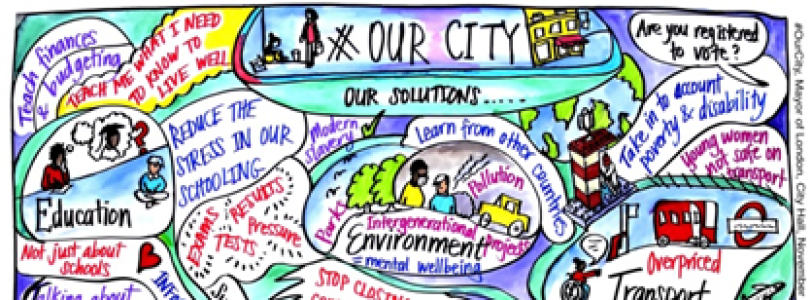Could you please introduce yourself to the reader?
I’m James Sloam, professor of politics at Royal Holloway University.
Why were you initially drawn to these research areas?
When I first started out in research, we were looking at the argument that political change happens through generational change. I was interested in democratic deficit and democratic decline. I was asking, where is that happening? The idea that it was happening within younger people was a generalisation, so I started digging deeper to understand the true complexities, such as which parts of the younger generation are in democratic decline.
I then started doing more work with the Greater London Authority looking at how this really works out in the real lives of young people. I work with a group of which 60% are care leavers. Mentors and community centres would make a huge difference to their employment and mental health. Ultimately, the government has dealt very badly with all the crises since 2008. I’m very interested in how the inclusion of young people in the political system could create better public policy.
Why have young people been marginalised in UK politics?
Firstly, I think there is a lack of understanding about young people. We as political scientists and also pollsters, who we get most of our data from, don’t really understand young people comprehensively. For example, when you survey 2,000 people, only a small proportion will be young people. The questions they ask also don’t allow for differences of opinion on topics such as the economy and healthcare. We have some real problems measuring because people aren’t really asking the right questions.
Furthermore, if young people protest, there’s often quite a negative portrayal in the media. In general, the traditional media portray young people badly in general. The readership of print media is older people in general. So they are portraying an agenda that is very much geared towards older people. Sometimes they make an effort to portray young people’s views, but I think it’s often very cursory. Young people are also a minority group. Older people outnumber young people in the electorate, meaning parties are far more likely to focus on issues higher up on the agenda for older people, such as immigration.
What prevents young people from voting in elections? This could be anything from political apathy to structural barriers.
In Britain it’s quite difficult because you don’t have much of a choice about who you vote for. Because there isn’t a variety of parties, it doesn’t show you very much about the opinions of young people. They may chose to vote for the Green Party with the full knowledge they won’t reach power.
The one danger is that political participation has become much more unequal. Another danger is the electoral system. To remedy the electoral system, we really need greater engagement between elections. Young people don’t really engage in politics at a local level. For example, MPs often hold office surgeries in daytimes between 9am-5pm. It’s very difficult for you to attend if you have a job or are still a student.
Looking more optimistically, there’s no reason why politicians can’t take on youth priorities. Whatever you think of Jeremy Corbyn, he went to young people and tried to address their issues. A lot of the things he put in the last manifesto were actually quite popular, despite people disliking or distrusting his personality. There’s no reason why someone like Starmer can’t do that. The parties should be challenged to mobilise young people and consider which issues in their manifesto are targeting young people. What are they doing on mental health, for example?
What are important indicators about how young people will vote?
Gender is becoming a more important indicator for voting behaviour in younger generations. Perhaps unsurprisingly, lots of young women in the US vote Democrat in larger numbers than young men due to the rollback on women’s rights. There, you also see race being an important factor in explaining how young people vote. Similarly, in the UK, in younger generations there are greater differences between young women and young men than in older generations. It’s more likely for young women to vote for the Labour Party than young men due to women’s rights issues. Women also tend to be in public sector jobs more than men.
Educational attainment is a further indicator. Students turn out in a higher proportion to the general population and people with lower educational backgrounds rarely participate.
There are many really interesting generational differences which offer more complexity than just ‘all young people hate the Tories.’
How else can we value the political participation of young people?
If you want to get involved and be civically and politically engaged, then getting involved at a lower level will increase the chance of seeing the fruits of your labour. Unfortunately, local council politics are not done very well in the UK. The Greater London Authority gives a bit of space to do more participatory politics. In the GLA they’ve got the Violence Reduction Unit, a Youth Assembly, the Peer Outreach Team, and a couple more too. Similarly, some of the metro mayors in Manchester and other cities have helped to increase participation. When policymakers team up with civil society or use the media, reaching out to young people is more effective.
Also, youth voices should be linked to policy making. There are newer approaches to public policy that should incorporate young people in decision making. A lot of time, when young people are included, you don’t actually see the fruits of your labour. I do think local councils might offer a positive alternative. There needs to be a culture change within political institutions whereby they learn how to work with young people as partners. Having the youth representatives is great, but I think working with young people more broadly is important and may be more sustainable.
In London you tend to have more people from diverse backgrounds going to the same school. There’s more mixing in terms of class and backgrounds. I think we need to understand that the UK is one of the most centralised democracies in the world. There’s very little power that people can have in localised regions. I think even MPs from parts of the country such as the Southwest also struggle to advocate for their area. The aim is to devolve power as much as possible, and that should include empowering young people.








0 Comments